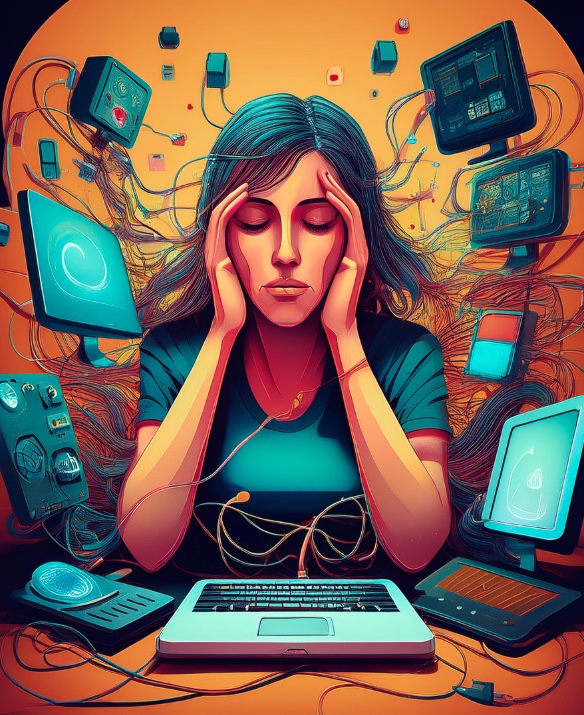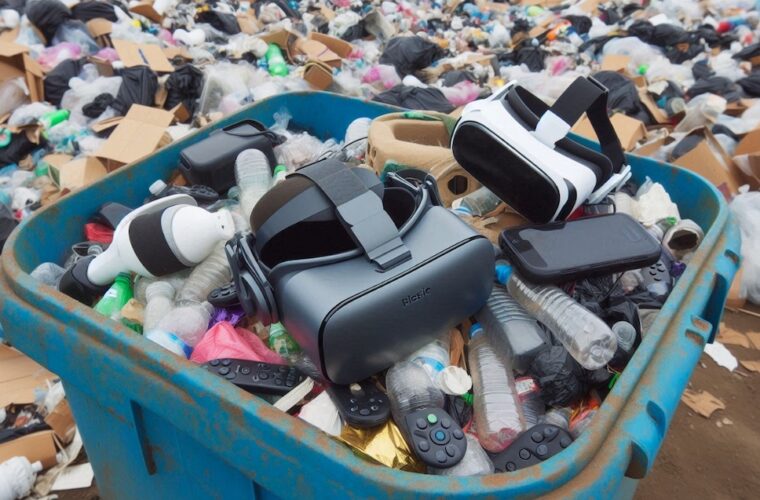Living in a hyper-connected world surrounded by a multitude of technological devices can paradoxically become a source of stress instead of comfort. This “technological overload” constantly bombards us with notifications, messages, and updates, making it difficult for us to concentrate and feel always connected but never truly present.
The need to manage several devices, each with its own peculiarities and applications, can generate a sense of confusion and frustration. At the same time, the fear of losing important information drives us to compulsively check our smartphones, tablets, and computers, even when resting or doing something else. This constant state of digital alertness strains the mind and can also affect the body, with symptoms such as sleep disturbances, headaches, and muscle tension. Furthermore, excessive attention to devices can negatively affect our social relationships, limiting real interactions and fostering isolation.
Technology has not set us free
A recent study commissioned by Honor on the launch of its new foldable smartphone, Magic V3, highlighted a growing problem: stress from “technology overload”. The research highlights how the use of multiple devices during the working day, such as laptops, tablets and smartphones, can negatively affect workers’ mental well-being.
Almost 9 out of 10 people juggle at least four devices to perform their tasks, and 28% of them, while recognizing the importance of technology in their daily work, admit to being overwhelmed by it. The incessant notifications, the weight of bags and backpacks full of devices and the difficulty of managing it all contribute to increased levels of stress and anxiety.
The study also reveals a growing desire for simplification: a quarter of workers would like to use a single device that can meet all their professional and personal needs. This aspiration is confirmed by the willingness of half of the respondents to invest in an all-in-one device and the interest of 16% in foldable phones, seen as a possible solution to the problem. Despite the apparent “addiction” to technology, with almost 14% admitting that their lives revolve around it, reducing the number of devices and adopting more integrated solutions seems to be gaining ground.
A new word: technostress
Technostress is “the discomfort caused by the inability to deal with new technologies in a healthy way”. The psychologist Craig Broad was the first 1984 to use this concept to refer to stress caused by using new technologies, especially computer technology; he defined technostress as “a modern discomfort caused by the inability to coexist with new computer technologies”. The term was later expanded by psychologists Weil and Rosen, who defined it as “any negative impact or attitude, thoughts, behaviour, or physical or psychological discomfort caused directly or indirectly by technology” (1998).

Working in a multitasking context where one finds oneself, at the same time, having to deal with different work tools (smartphone, tablet, computer, office phone), which in turn contain multiple applications, on the one hand, has created many advantages but on the other hand, could lead to harmful consequences for the health of the worker who sees himself overloaded with communication and with the feeling of not being able to handle the tasks assigned to him. This “new” form of stress would seem to affect, in most cases, those who work in highly computerized environments characterized by a strong reduction or even deprivation of personal relationships (remote work) as well as an exasperated control of technology over their activities.
Less is more
There is a growing realization that the accumulation of technological devices does not always translate into greater efficiency and can even generate a sense of overload and frustration. More and more people are looking for more integrated and simple solutions that can lighten the ‘digital burden’ and foster a more balanced relationship with technology. This trend is also driven by technological evolution, which allows an increasing number of functionalities to be concentrated in increasingly compact and versatile devices.
Foldable smartphones, 2-in-1 laptops, and smartwatches with advanced functionalities are just a few examples of this technological convergence. At the same time, the spread of multi-device software and platforms allows us to access our data and work from any device, reducing the need to own multiple specialized devices. It is no coincidence that many companies also adopt ‘device light’ policies, encouraging employees to use a limited number of devices to promote concentration and productivity.



